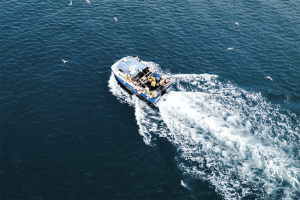Marine Conservation Society, Royal Society for the Protection of Birds and WWF team up for ‘Shifting Gears’ report

Three leading environmental groups on Wednesday released a report urging UK fisheries to address climate impacts by modernizing how seafood is sourced.
The UK Marine Conservation Society (MCS), the Royal Society for the Protection of Birds and The World Wide Fund for Nature (WWF) released “Shifting Gears: Achieving Climate-Smart Fisheries” to reduce carbon emissions from the UK fishing fleet, enhance marine biodiversity by reducing or reversing damage from unsustainable fishing practices, and increase the seas’ potential to absorb carbon emissions.
“We cannot build a sustainable, healthy seafood sector whilst damaging the marine environment,” said Gareth Cunningham, head of fisheries and aquaculture at MCS. “We need a modern approach to how we source our seafood; not just to address the dual climate and nature crises, but to ensure that sustainable seafood is an integral part of the UK food system.”
“Shifting Gears” urges a number of changes to UK commercial fisheries, including reducing pressure from fishing gear like trawls and dredges and incentivizing the adoption of less-damaging methods like bottom longlines. The report calls for greater transparency and traceability across supply chains and creating incentives to “decarbonize” the fleet by reducing dependence on fossil fuels.
“The fishing industry’s carbon footprint combined with its significant impacts on long-term carbon capture and storage in blue carbon habitats makes the industry an important consideration when designating [greenhouse gas, GHG] reduction and climate mitigation strategies,” the report states. “However, governments have generally been slow to acknowledge the fishing industry’s impact on GHG emissions and blue carbon stores. Fisheries are commonly missed from assessments of GHGs, not considered in climate change mitigation strategies and are largely ignored during climate negotiations.”
Click here for the full report.
Follow the Advocate on Twitter @GAA_Advocate
Now that you've reached the end of the article ...
… please consider supporting GSA’s mission to advance responsible seafood practices through education, advocacy and third-party assurances. The Advocate aims to document the evolution of responsible seafood practices and share the expansive knowledge of our vast network of contributors.
By becoming a Global Seafood Alliance member, you’re ensuring that all of the pre-competitive work we do through member benefits, resources and events can continue. Individual membership costs just $50 a year.
Not a GSA member? Join us.
Author
-
Responsible Seafood Advocate
[103,114,111,46,101,99,110,97,105,108,108,97,101,114,117,116,108,117,99,97,117,113,97,64,114,111,116,105,100,101]



